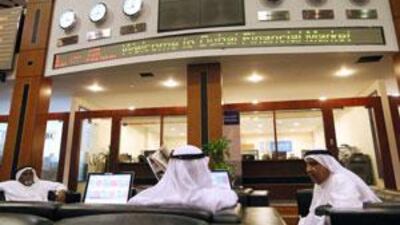After giving up some of their recent gains last week, UAE markets will be watching closely as earnings announcements are made this week. The weakness last week was mostly driven by retail investors off-loading financial services, construction and property stocks. Analysts were encouraged, however, that few institutional investors were selling.
"If you look at the trading patterns, you will notice funds and institutions are holding steady. This particular bout of selling is mostly retail and doesn't worry me," said Hassan Awan, an associate at the asset management division of The National Investors in Abu Dhabi. The Abu Dhabi Securities Exchange General Index and the Dubai Financial Market General Index lost during the first trading week this month. Dubai was the biggest loser among regional markets, ending down 5.1 per cent while the bourse in the capital dropped 1.3 per cent.
After the announcement of a proposed settlement between Dubai World and its creditors, the Dubai bourse finished last month with 16 per cent gains and the Abu Dhabi bourse rose almost 6 per cent. However, there was some evidence that worries about Dubai World were creeping back as the market awaited a final deal. Although retail investors are skittish, many funds continue to hold property stocks that, despite the recent pull-back, are still comfortably higher of late. Emaar and Aldar are both up more than 25 per cent from their closing levels on March 1.
"There is a long-term value to be had in stocks such as Emaar in Dubai and Aldar and Sorouh in Abu Dhabi. There is no sense for funds to exit before the earning reports are out for property firms," said Ayman el Saheb, the head of operations at Darahem Financial Brokerage in Dubai. Mr Awan said he did not forecast stellar performances from UAE banking shares as provisions for bad loans continued to weigh on lenders' books.
Etisalat and Aramex are among the regional companies that have defied the difficult economic conditions. Qatar's main measure was the biggest gainer among the regional indexes last week, gaining 2.1 per cent, mainly propped up by impressive first-quarter earnings from Qatar National Bank (QNB), the country's largest lender by market capitalisation. The bank's first quarter net profit rose 25.3 per cent, beating analyst forecasts, driven by a sharp increase in lending activity and deposits.
The QNB results could set the tone for the trade on the Qatari bourse this week, too. "Qatar banks have performed better than others and with more such results next week, I would expect the index to bounce up further," Mr Awan said. Worries over the heavyweight logistics company Agility could prove a drag on Kuwait's index. The market is awaiting the final outcome of Agility's dispute with the US department of justice over alleged overcharging by the firm on several contracts with the US army in the region.
Trading in Agility shares have been suspended since last week, and the company has said it will announce its full-year earnings report today. The Kuwait index gained an aggregate 1.3 per cent over the past five trading sessions. Trading on the Saudi bourse is expected to remain flat, continuing the pattern from last week as investors await results from blue chip firms. The Saudi Tadawul All Share Index closed the week 0.3 per cent higher.
Around the world, heavyweights, giants and a minnow will battle it out for investors' attention this week, each with the potential to scramble already jittery financial markets. The heavyweights are the so-called "BRICs" - Brazil, Russia, India and China - which will hold a summit in Brasilia. The giants are primarily US companies, whose first-quarter reporting season is beginning. The minnow is the economically challenged Greece, whose debt problems have not gone away and are triggering headlines such as "Wall Street set to fall on Greece".
Promises of emergency help from the EU and IMF have failed to calm markets about a possible default and banking crisis in the euro zone member. During the past week, stocks slid, the euro fell and the yield spreads on euro zone government bonds widened to record levels, all as a result of Greece's travails. Its problems have now brought urgent calls from investors for authorities to act rather than just promise action.
"We'll probably get lots of confusing noise in coming weeks on this front, but at the end of the day, I think we'll get an IMF programme [co-financed by the euro zone] before the end of the month," Erik Nielsen, the chief European economist at Goldman Sachs, said in a note. The meeting of the world's emerging-market powerhouses in Brazil is another sign of the changing global landscape facing investors.
Representing 40 per cent of the world's population and about 20 per cent of the global economy, the BRIC countries' decisions carry increasing weight, even if they argue that they are not seeking to replace the Group of Eight wealthy nations. The meeting - theoretically about mutual trade and investment - will be closely watched primarily by currency traders, given that the group has previously talked of becoming less dependent on the US dollar.
Among the US companies whose first-quarter earnings reports are expected this week are JP Morgan Chase, Bank of America, General Electric, Google and Intel. European companies report a week later. The Australian mining company Rio Tinto will report on Thursday. * with Reuters @Email:skhan@thenational.ae


